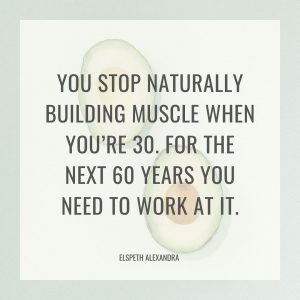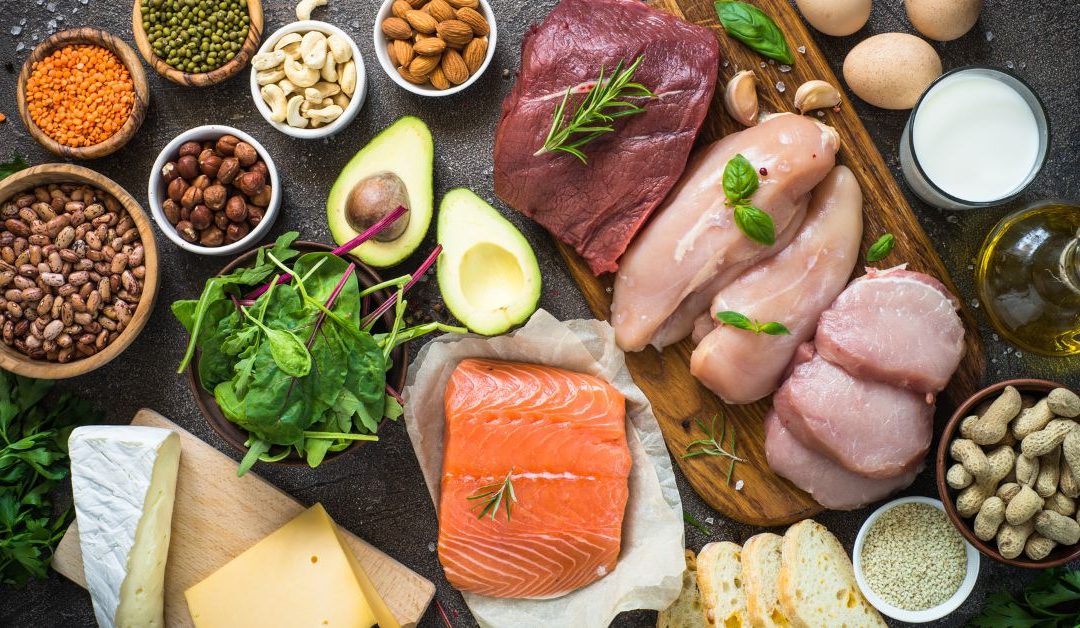Do you exercise hard? I hope you do – lifting heavy things a few times a week is brilliant for your health.
But exercise is only part of the story.
When you exercise, especially when you’re pushing yourself hard, you’re creating micro-tears in the muscle fibres. Your body responds to this by repairing the damage, which makes the muscle fibres stronger. And this repair work requires amino acids – which we find in protein.
It’s called muscle protein synthesis – the process of repairing muscle tissue and building new muscle. This can lead to hypertrophy – increase and growth of muscles. (That’s high-per-troh-fee, not a giant award.)
So in short – you can’t build strong muscles without eating protein. Come with me for some more information…
Remind me why I want to build muscle?
 Lack of muscle is arguably more of a health problem than obesity. Type 2 diabetes, insulin sensitivity and obesity are problems with our metabolism and all have their roots in muscle.
Lack of muscle is arguably more of a health problem than obesity. Type 2 diabetes, insulin sensitivity and obesity are problems with our metabolism and all have their roots in muscle.
Lower muscle mass correlates with all-cause mortality – so more muscle helps you live longer. It basically makes you harder to kill.
Building muscle makes your bones stronger, so you’re less likely to have fractures as you age.
Muscle is an endocrine organ and building muscle can help you produce more estrogen, which is very helpful in perimenopause.
Muscles support joints. So if you suffer from achy joints, if you groan as you get off the sofa, or if you have arthritis, building muscle will help you out of pain.
More muscle mass has also been shown to reduce your risk of cardiovascular disease – which is the biggest killer of women.
What’s more, muscle is useful – it makes you stronger, which affects your ability to do useful things, like chase children, carry shopping, walk up hills. The more muscle you have, more carbohydrate and fat your body burns.
You might also prefer a ‘toned’ appearance for your body, which basically means more muscle and less fat.
Additionally muscle is metabolically active, and requires more energy consumption to maintain – hence the phrase ‘muscle pays for the party’, because having more muscle means you can eat more food.
Does it matter that I’m female?
Hell yes, Queen, it does.
First of all it matters because for decades we’ve been told that we should eat less, take up less room and be skinny. Eating protein and building muscle is still an act of rebellion for many of us.
Secondly, when you have higher levels of progesterone – during the second half of your menstrual cycle, between ovulation and menstruation – you’re in a catabolic state. That means you’re losing muscle, not growing it.
That’s because your body uses protein to build the lining of your uterus, in case you get pregnant. So you’re more inclined to lose muscle than build it in the fortnight before your period.
Thirdly, women’s fitness expert Stacy T Sim says:
“During peri and post-menopausal years, our sex hormones begin to fluctuate and decline, and we lose the anabolic (muscle-making) stimulus that estrogen helped provide. So we need more protein to pick up the slack where our hormones left off. Research also shows that with age, we also need more protein for the same training adaptations.”
So you need to eat even more protein if you’re round about the menopause.
Other benefits of eating adequate protein are:
- It speeds up your recovery,
- It reduces post-exercise soreness, and
- It lowers your risk for injury.
So what do I need to eat?
According to Stacy T Sim again:
Women should aim for 1.7 to 2.4 grams of protein per kilogram of body weight per day.
Women in the menopause transition should target the higher end of that range (2.2 to 2.4 grams per kilogram), aiming for the lower end on easier days and the higher end on very heavy training days.
I’d add that if you’re in a healing state – like the first 12 weeks after having a baby – you should aim for that upper end of the scale too.
So for instance, if you weigh 70kg (11 stone) you need between 119g and 168g of protein per day.
I’m not gonna lie, that’s gonna sound like a lot of protein for most people. You might be like, “how much?!” But remember this isn’t extra calories – it’s not a case of eating more protein on top of your current food. It’s more likely to be switching the make-up of your plate to a less carbohydrate, more protein-rich foods.
Protein also increases satiety meaning you’ll feel fuller after you eat a protein-rich meal.
When you eat your protein is also important – not least because your body can’t store protein and needs you to consume it in a “little and often” manner.
As an exerciser, aim for 30 grams of protein within 30 to 45 minutes after exercise and regular doses of 30 to 40 grams of protein at each meal and 15 to 20 at your snacks.
As you reach peri and postmenopause, your anabolic resistance increases, so you want to aim to have that post-exercise protein closer to 40 grams.
It’s also really helpful to get protein with breakfast, because an early spike in amino acids (particularly lucine) is required to trigger muscle growth. The more you can eat at the start of the day, the more you’ll encourage your body to start building muscle.
What foods shall I eat, then?
I’m a big fan of Just Eating Real Food (JERF) when it comes to protein. High protein is a bit of a marketing fad at the moment and often the foods in question are ultra-processed and heavy on the sugar or sweeteners.
After a gym session, getting your protein within the 45 minute window means that convenience is queen. I love it when my clients come to gym sessions with a couple of boiled eggs in their kit bag!
I like yoghurt – most of the supermarkets stock high protein yoghurts in sucky pouches with 15-25g of protein in them. Sometimes protein powders are convenient but they’re not always palatable.
2 eggs = 11g
Grilled chicken breast = 38g
60g tuna = 15g
Regular yoghurt = 6g per 120g
Milk = 4g per 120ml
Lentils & pulses = 10g per 120g
Nuts and seeds = 4g per 20g
Hummus = 4g per 50g
A couple of words of caution
Don’t get obsessed with the numbers because that’s not good for your mental health! But counting your protien intake for a couple of days will let you know if you’re getting enough or how far you still have to go.
Don’t let perfect be the enemy of good – it’s fine to start off by simply doing a bit better, even if you don’t hit your target every day. Start by becoming aware of protein, then eat a bit more of it, and be on the lookout for new proteiny foods.
Remember that exercise wears you down, and it’s protein that builds you back up.
Interested in learning more about eating habits and exercise?
I offer personal training sessions and advice to build you the ideal weekly programme, whatever your current fitness level.
Why not book a Clarity Call with me to see how we can work together?


